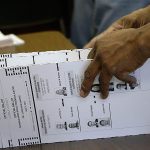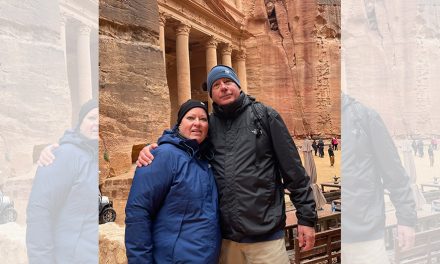
COVID-19 uncontrolled spread warning issued for 29 chapters
WINDOW ROCK
Navajo Nation has over two-dozen communities that have been listed for its uncontrolled spread of COVID-19.
While the Navajo Nation and the entire world wait to hear the results of the presidential election, the Department of Health issued a health advisory notice to warn Navajo Nation to keep their guard up when it comes to the coronavirus.
“The uncontrolled spread of COVID-19 means that people who are testing positive in these areas likely do not know where or how they contracted the virus,” stated President Jonathan Nez.
“We are back to the point of community spread in certain parts of the Navajo Nation,” he said. “Stay home as much as possible, always wear a mask in public, practice social distancing, avoid large crowds including family gatherings, and wash your hands often and use hand sanitizer in public.”
The communities NDOH warned about are: Alamo, Aneth, Bird Springs, Bodaway-Gap, Cameron, Casamero Lake, Church Rock, Counselor, Coyote Canyon, Crownpoint, Dilkon, Ganado, Indian Wells, Iyanbito, Jeddito, Kaibeto, Leupp, Nahatadziil, Red Mesa, Round Rock, Sanostee, Sheepsprings, Shiprock, Teesto, Tohajiilee, Tolani Lake, Tonalea, Torreon and Two Grey Hills.
To encourage people to stay local and stay safe during the weekend curfews, a new public health order allows gas stations, grocery stores, laundromats and restaurants to remain open between the hours of 7 a.m. and 3 p.m. during the weekend curfews. These businesses are required to ensure employees and customers wear masks, practice social distancing, disinfect high-touch surfaces, have access to hand washing stations, sanitizers and gloves, and limit the number of customers in an enclosed area. Restaurants and food establishments must operate on a curbside or drive-through basis only.
During the Nov. 2 Navajo Nation Council special session where delegates debated whether to approve a bill to re-open Navajo casinos, Loretta Christensen, chief medical officer for the Navajo Area Indian Health Service, informed delegates of long-term impacts on a person who had COVID-19.
“We realized this virus is extremely damaging to multiple systems in our body,” said Christensen. “The most concerning is damage to the heart. It causes inflammation in all vessels, particularly small vessels. We are seeing late strokes and strokes in young people.”
An on-going survey continues and this is where Christensen is gathering the symptoms of COVID-19 and the most prevalent are fatigue, shortness of breath, headaches, muscle pain and weakness.
“There’s a lot of other symptoms represented but these are the top four right now,” said Christensen.
As of Wednesday night there were 131 new cases of COVID-19 and 586 deaths. Reports indicate that 7,613 individuals have recovered from COVID-19, and 127,901 COVID-19 tests have been administered. The total number of positive COVID-19 cases is now 12,080.
As a public service, the Navajo Times is making all coverage of the coronavirus pandemic fully available on its website. Please support the Times by subscribing.
How to protect yourself and others.
Why masks work. Which masks are best.
Resources for coronavirus assistance








 Highway 264,
Highway 264, I-40, WB @ Winslow
I-40, WB @ Winslow